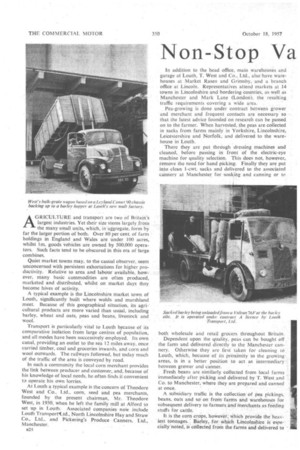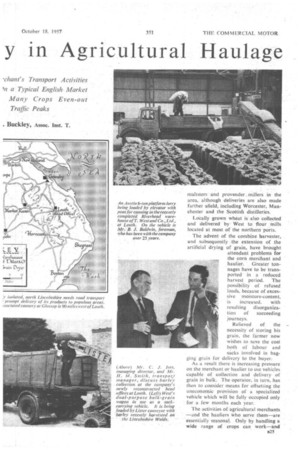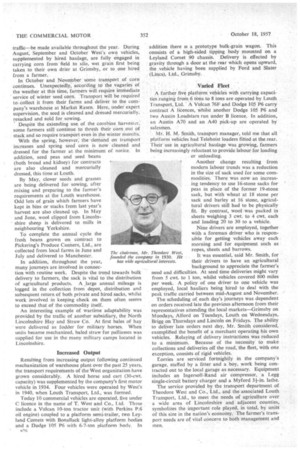Non-Stop Va y in Agricultural Haulage
Page 58

Page 59

Page 60

If you've noticed an error in this article please click here to report it so we can fix it.
. Buckley, Assoc. Inst. T.
AGRICULTURE and transport are two of Britain's largest industries. Yet their size stems largely from the many small units, which, in aggregate, form by far the larger portion of both. Over 80 per cent. of farm holdings in England and Wales are under 100 acres, whilst lm. goods vehicles are owned by 500,000 operators. Such facts tend to be obscured in this era of -large combines,
Quiet market towns may, to the casual observer, seem unconcerned with persistent exhortations for higher productivity. Relative to area and labour available, however, many basic commodities are often produced, marketed and distributed, whilst on market days they become hives of activity.
A typical example is the Lincolnshire market town of Louth, significantly built where wadsand marshland meet. Because of this geographical situation, its agricultural products are more varied than usual, including barley, wheat and oats, peas and beans, livestock and wool.
Transport is particularly vital to Louth because of its comparative isolation from large centres of population, and all modes have been successively employed. Its own canal, providing art outlet to the sea 12 miles away, once carried timber, coal and groceries inwards, and corn and wool outwards. The railways followed, but today much of the traffic of the area is conveyed by road.
In such a community the local corn merchant provides the link between producer and customer, and, because of his knowledge of local needs, he often finds it convenient to operate his own lorries.
At Louth a typical example is the concern of Theodore West and Co., Ltd_ corn, seed and pea merchants, founded by the present chairman, Mr. Theodore West, in 1930, when he left the family mill at Alford to set up in Louth. Associated companies noW include. Louth Transportlid., North Lincolnshire Flay and Straw Co., Ltd.. and Pickering's Produce Canners, Ltd., Manchester.
n24 In addition to the head office, main warehouses and garage at Louth, T. West and Co., Ltd., also have warehouses at Market Rasen and Grimsby, and a branch office at Lincoln. Representatives attend markets at 14 towns in Lincolnshire and bordering-counties, as well as Manchester and Mark Lane (London), the resulting traffic requirements covering a wide area.
Pea-growing is done under contract between grower and merchant and frequent contacts are necessary so that the latest advice founded on research can be passed on to the farmer. When harvested, the peas are collected in sacks from farms mainly in Yorkshire, Lincolnshire, Leicestershire and Norfolk, and delivered to the warehouse in Louth.
There they are put through dressing machines and cleaned, before passing in front of the electric-eye machine for quality selection. This does not, however, remove the need for hand picking. Finally they are put into clean 1-cwt. sacks and delivered to the associated cannery at Manchester for soaking and canning or to both wholesale and retail grocers throughout Britain.
Dependent upon the quality, peas can be bought off the farm and delivered directly to the Manchester cannery. Otherwise they are lirst taken for cleaning to Louth, which, because of US prOximity to the growing areas, is in a better position to act as intermediary between grower and canner.
Fresh beans are similarly collected from local farms immediately after picking and delivered by T. West and Co. to Manchester, where they are prepared and canned' at once.
A. subsidiary traffic is the collection Of Pea pickings, beans, oats and so on from fartits and 'warehouses for subsequent delivery to farmers anclinerchants as feeding
stuffs for cattle. • .
It is the COM erpps, however ," Which provide the -heaviest tcinnageS. Barley,, for which Lincolnshire is espe-clay-noted, is collected from the farms and delivered to
maltsters and provender millers in the area, although deliveries are also made farther afield, including Worcester, Manchester and the Scottish distilleries.
Locally grown wheat is also collected and delivered by West to flour located at most of the northern ports.
The advent of the combine harvester, and subsequently ,the extension of the artificial drying of grain, have brought attendant problems for the corn merchant and
haulier. Greater tonnages have to be transported in a reduced harvest period. The possibility of refused loads, because of excessive moisture-content,
is increased, with resulting disorganization of succeeding journeys.
Relieved of the necessity of storing his grain, the farmer now wishes to save the cost both of labour and sacks involved in bagging grain for delivery to the buyer;
As a result there is increasing pressure on the merchant or haulier to use vehicles capable of collection and delivery of grain in bulk. The operator, in turn, has then to consider means for offsetting the uneconomic provision of a specialized vehicle which will be fully occupied only for a few months each year.
The activities of agricultural merchants —and 'the hauliers who serve them—are essentially seasonal. Only by handling a wide range of crops can work—and traffic—be made available throughout the year. During August, September and October West's own vehicles, supplemented by hired haulage, are fully engaged in carrying corn from field to silo, wet grain first being taken to their own drier •at Grimsby, or to one hired from a farmer.
In October and November some transport of corn continues. Unexpectedly, according to the vagaries of the weather at this time, farmers Will require immediate service of winter seed corn. Transport will be required to.collect it from their farms and deliver to the company's warehouse at Market Rasen. Here, under expert supervision, the seed is cleaned and dressed mercurially. resacked and sold for sowing.
Despite the extending use of the combine harvesW; some farmers still continue to thresh their corn out of stack and so require transport even in the winter months.
With the spring, however, the -demand on transport increases and spring seed corn is now cleaned and dressed for the farmer at. the minimum of notice. In addition, seed peas and seed beans (both broad and kidney) for contracts are also cleaned and mercurially dressed, this time at Louth.
By May, clover seeds and grasses are being delivered for sowing, after mixing and preparing to the farmer's requirements at the Louth warehouse. Odd lots of grain which farmers have kept in bins or stacks from last year's harvest are also cleaned up. In May and June, wool clipped from Lincolnshire sheep is delivered to mills in neighbouring Yorkshire.
To complete the annual cycle the fresh beans grown on contract to Pickering's Produce Canners, Ltd., are collected from local farms in June and July and delivered to Manchester.
In addition, throughout the year, many journeys are involved in connection with routine work. Despite the trend towards bulk delivery to farmers, the sack is vital to the distribution of agricultural products. &large annual mileage is logged in the collection from depot, distribution and subsequent return of both private and hired sacks, whilst work involved in keeping check on them often seems to exceed that of the commodity itself.
An interesting example of wartime adaptability was provided by the traffic of another subsidiary, the North Lincolnshire Hay and Straw Co. At first bales of hay were delivered as fodder for military horses. When units became mechanized, baled straw for palliasses was supplied for use in the many military camps located in Lincolnshire.
Increased Output
Resulting from increasing output following continued mechanization of warehouse plant over the past 25 years, the transport requirements of the West organization have grown considerably. A hired horse and cart (30-cwt. capacity) was supplemented by the company's first motor vehicle in 1934. Four vehicles were operated by West's in 1940, when Louth Transport, Ltd., was formed.
Today 10 commercial vehicles are operated, five under C licence in the name of T. West and Co., Ltd. These include a Vulcan 10-ton tractor unit (with Perkins P.6 oil engine) coupled to a platform semi-trailer, two Leyland Comets with Bonallack light-alloy platform bodies and a Dodge 105 P6 with 6-7-ton platform body. In addition there is a prototype bulk-grain wagon. This consists of a high-sided tipping body mounted on a Leyland Comet 90 chassis. Delivery is effected by gravity through a door at the rear which opens upward, the vehicle having been supplied by Ford and Slater (Lines), Ltd., Grimsby.
Varied Fleet
A further five platform vehicles with carrying capacities .ranging from 6 tons to 8 tons are operated by Louth Transport, Ltd. A Vulcan 76F and Dodge 105 P6 carry contract A licences, whilst another Dodge 105 P6 and two Austin Loadstars run under B licence. In addition, an Austin A70 and an A40 pick-up are operated by salesmen.
Mr. H. M. Smith, transport manager, told me that all platform vehicles had Telehoist loaders fitted at the rear. Their 'use in agricultural haulage was growing, farmers being increasingly reluctant to Provide labour for loading or unloading.
Another change resulting from modern labour trends was a reduction in the size of sack used for some commodities. There was now an increasing tendency to use 16-stone sacks for peas in place of the former 19-stone sack, but With wheat at 18 stone per sack and barley at 16 stone, agricultural drivers still had to be physically fit. By contrast, wool was packed in sheets weighing 3 cwt. to 4 cwt. each and loading 20 to 30 to a vehicle.
Nine drivers are employed, together with a foreman driver who is responsible for getting vehicles away each morning and for equipment such as ropes, sheets and barrows.
It was essential, said Mr. Smith, for their drivers to have an agricultural background to appreciate the farmer's need and difficulties. At seed time deliveries might vary from 5 cwt. to 1 ton, whilst vehicles covered 800 miles per week. A policy of one driver to one vehicle was employed, local hauliers being hired to deal with the peak traffic carried between mid-August and November.
The scheduling of each day's journeys was dependent on orders received late the previous afternoon from their representatives attending the local markets—Grimsby on Mondays, Alford on Tuesdays, Louth on Wednesdays, Brigg on Thursdays and Lincoln on Fridays. The ability to deliver late orders next day, Mr. Smith considered, exemplified the benefit of a merchant operating his own vehicles. Relaying of delivery instructions was reduced to a minimum. Because of the necessity to make collections and deliveries off the road, the fleet, with one exception, consists of rigid vehicles.
Eorries are serviced fortnightly in the company's garage, staffed by a fitter and a boy, work being contracted out to the local garage as necessary. Equipment includes an Ingersoll-Rand air compressor, a Legg single-circuit battery charger and a Myford 3+-in. lathe.
The service provided by the transport department of Theodore West and Co., Ltd., and the associated Louth Transport, Ltd., to meet the needs of agriculture over a wide area of Lincolnshire and adjacent counties, symbolizes the important role played, in total, by units of this size in the nation's economy. The farmer's transport needs are of vital concern to both management and men.




















































































































